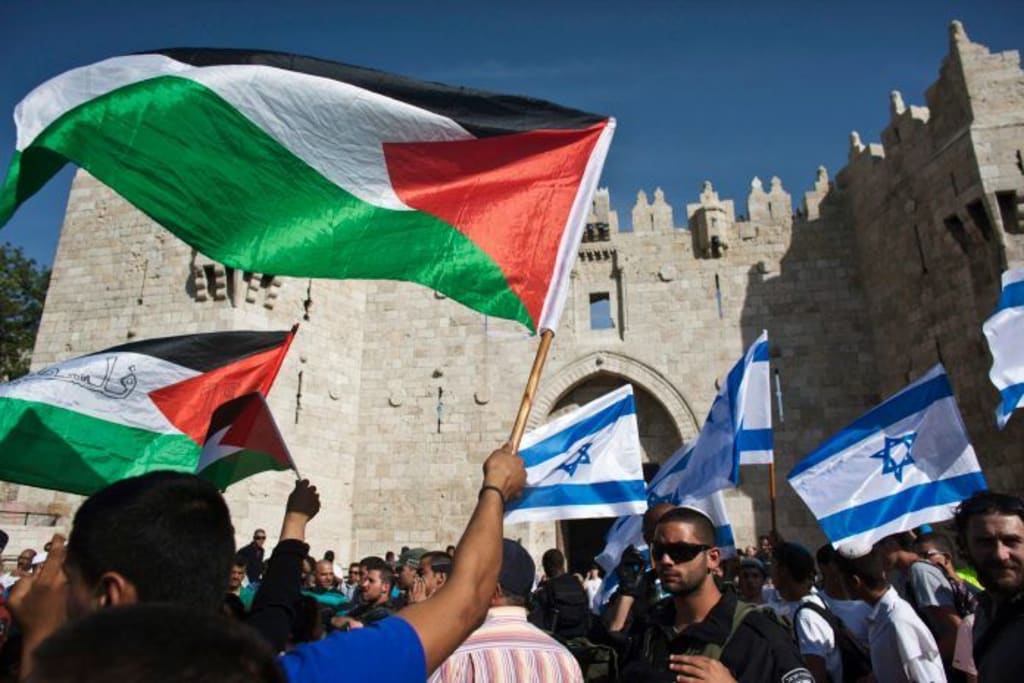Content warning
This story may contain sensitive material or discuss topics that some readers may find distressing. Reader discretion is advised. The views and opinions expressed in this story are those of the author and do not necessarily reflect the official policy or position of Vocal.
The Israeli-Palestinian Conflict from Past to Present
Echoes of Struggle

Background:
The roots of the Israeli-Palestinian conflict can be traced back to the late 19th and early 20th centuries when Jewish and Arab national movements emerged in the Middle East, particularly in the territory known as Palestine. After World War I, the League of Nations granted Britain a mandate over Palestine, leading to increased Jewish immigration and Arab resistance.
The conflict between Israel and Palestine is a complex and long-standing one, with roots dating back to the late 19th century. The conflict is often framed as a religious one, between Jews and Muslims, but it is also a political and territorial conflict.
1947-1949: The Partition Plan and First Arab-Israeli War:
In 1947, the United Nations proposed a partition plan that would divide Palestine into separate Jewish and Arab states, with Jerusalem as an international city. Jewish leaders accepted the plan, but Arab leaders rejected it, leading to a conflict. The State of Israel was established on May 14, 1948. Arab states, including Egypt, Jordan, Syria, and Iraq, intervened, leading to the first Arab-Israeli war. The war ended in 1949 with armistice agreements, solidifying Israel's independence but leaving the issue of Palestinian statehood unresolved.
1956, 1967, and 1973: Suez Crisis, Six-Day War, and Yom Kippur War:
In 1956, Israel, along with the UK and France, invaded Egypt during the Suez Crisis. In 1967, Israel fought the Six-Day War against Egypt, Jordan, and Syria, resulting in Israel's occupation of the West Bank, Gaza Strip, Sinai Peninsula, and Golan Heights. In 1973, Egypt and Syria launched a surprise attack on Israel on the Jewish holy day of Yom Kippur, leading to the Yom Kippur War.
1987-1993: First Intifada and Oslo Accords:
The late 1980s saw the beginning of the First Intifada, a Palestinian uprising against Israeli rule in the occupied territories. In 1993, secret negotiations in Oslo resulted in the Oslo Accords, a peace agreement between Israel and the Palestine Liberation Organization (PLO). The accords established the Palestinian Authority and outlined a process for achieving Palestinian self-determination.
2000-2005: Second Intifada and Disengagement Plan:
The Second Intifada erupted in 2000, resulting in significant violence and casualties on both sides. In 2005, Israel unilaterally withdrew from the Gaza Strip, dismantling settlements and withdrawing its military forces. However, the situation in Gaza remained tense, leading to conflict between Israel and Palestinian militant groups like Hamas.
2006-Present: Ongoing Conflict, Gaza Wars, and Peace Efforts:
The conflict has persisted with periodic escalations, including conflicts in Gaza in 2008-2009, 2012, and 2014. Efforts to negotiate a peace settlement, including talks brokered by the United States, the United Nations, and other international actors, have faced significant challenges, including issues related to borders, refugees, Jerusalem, and security arrangements.
2014: Israel launching a major attack:
In 2014, Israel launched a major offensive against Hamas in the Gaza Strip. The offensive lasted for 50 days and resulted in the deaths of over 2,200 Palestinians and 73 Israelis.
2023:Current situation:
The current situation between Israel and Palestine is complex and tense. There is no peace agreement in place, and violence continues on both sides.
The Israeli occupation of the Palestinian territories continues, and the Palestinians are seeking to establish an independent state. The Israeli government has built a separation barrier between Israel and the West Bank, which has limited Palestinian movement and access to land.
The blockade of the Gaza Strip remains in place, and the humanitarian situation there is dire. The blockade has restricted the movement of people and goods, and has made it difficult for Palestinians to access essential services.
There have been several rounds of peace talks between Israel and the Palestinians, but these have not been successful. The main sticking points in the negotiations are the status of Jerusalem, the right of return for Palestinian refugees, and the borders of a future Palestinian state.
In recent years, there has been an increase in violence between Israelis and Palestinians. This violence has taken place in the form of rocket attacks, airstrikes, and shootings.
The United Nations has called on both sides to end the violence and to resume peace talks. The international community has also expressed support for a two-state solution to the conflict.
The current situation between Israel and Palestine is a difficult one, and there is no easy solution. However, it is important to continue to work towards a peaceful resolution. The people of Israel and Palestine deserve to live in peace and security.
Let us all pray for the both........
About the Creator
Kobra
"Enter the dark and twisted world of the unknown I lead you through the shadows on a journey into the depths of the unknown."
"Uncovering darkness"
Enjoyed the story? Support the Creator.
Subscribe for free to receive all their stories in your feed. You could also pledge your support or give them a one-off tip, letting them know you appreciate their work.






Comments
There are no comments for this story
Be the first to respond and start the conversation.